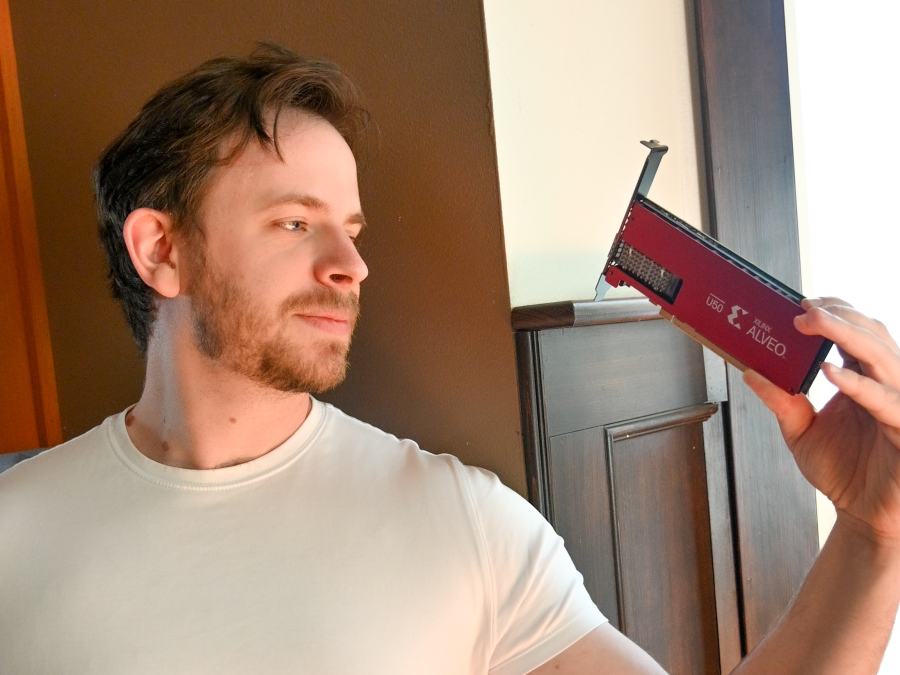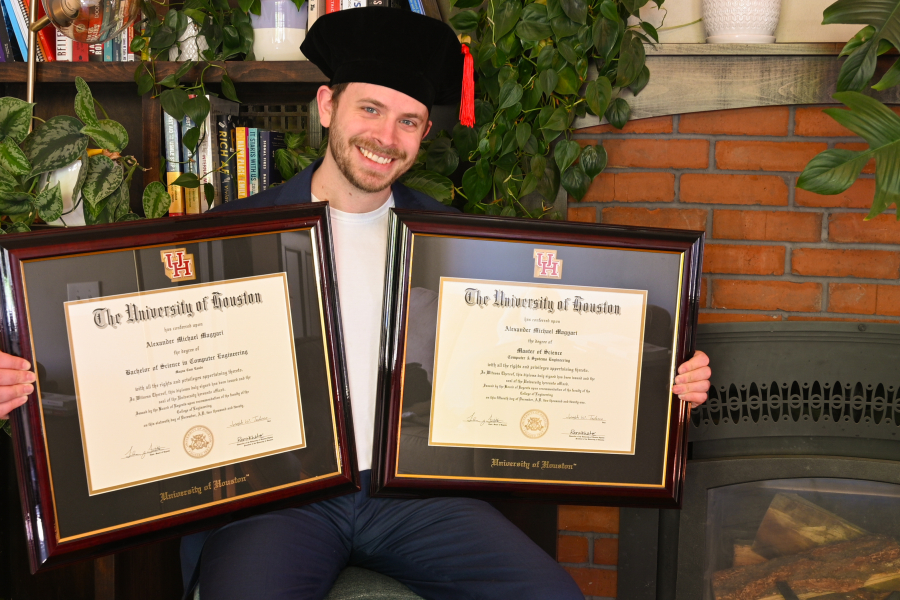Quantum cryptography researcher Alexander Magyari is completing the hat trick: at the end of this semester, he will have earned his bachelor’s degree, his master’s degree and his Ph.D. from the Cullen College of Engineering. Now, he’s devoting his time and talents to strengthening available security resources in the face of the rapidly changing landscape of quantum computing.
Though he initially hadn’t planned to stay at the University of Houston after completing his bachelor’s degree — at first, he wasn’t even planning to pursue graduate school at all — a research project offer from his mentor, associate professor Yuhua Chen, D.Sc., in his senior year of undergraduate studies set everything in motion.
“She continued to mentor me through my master’s program, and she’s my mentor now, so she’s ultimately the reason I stayed at UH – it was for her guidance. The value of a graduate program comes not just from the program itself, but from your advisor. You could end up at a top school like MIT, but if you don’t have a good mentor, then that could be practically worthless, especially if you’re investing a lot of time in research,” said Magyari.
“I think that a lot of my success — not just in academics but in my career as well — has been guided by Dr. Chen. In fact, she’s the one who pushed me to work full-time and gain career experience while studying. She’s probably the biggest reason why I stayed at UH.”
As an undergraduate, Magyari was involved with Sigma Nu fraternity and served as chapter president for two years. He then completed his accelerated master’s degree in one year, graduating with a 4.0 GPA. Most recently, he was recognized with a Best Paper award at an IEEE conference on the Internet of Things in Taiwan.
“I’ve had quite a few publications, and I’m proud of each of those,” he said. “Individually, they all represent a tremendous amount of work.”
One recent publication in Electronics, “Hardware Optimized Modular Reduction”, sets the stage for a tumultuous decade ahead in the field of quantum computing and cryptography.
Quantum computers can facilitate the acceleration of a variety of applications, like statistical analysis and DNA research, but they also have one major downside: they enable operators to crack modern encryption methods. This has significant implications for data security in areas like healthcare, propriety research and financial services.
“Something that everyone knows is on the horizon is a cryptographically relevant quantum computer, or CRQC. That is going to enable both foreign adversaries and anyone with the capability to get their hands on one to recover information that’s supposed to be secured, which is obviously a problem,” Magyari said. “Encryption as we know it wasn’t designed to withstand attacks from quantum computers. We’re expecting a CRQC to be viable within the next ten years — that’s right around the corner.”
“My work specifically seeks to address that in a field called post-quantum cryptography — new cryptographic methods that can withstand quantum attacks,” he continued. “All of my research is looking at implementing those algorithms on hardware and reducing area and power consumption by that hardware, as well as looking into how we can make these algorithms faster. This field is evolving quickly.”
Magyari’s current focus concerns translating modular reduction — a common cryptographic mathematical operation — from software, to which it’s optimized, to hardware.
“The issue with [existing cryptographic algorithm] options that were presented to me is that they’re designed for software, so moving them into a hardware environment is not just challenging — it’s inefficient. So I offered this new method, which is designed specifically for hardware and is a lot more efficient than the other two methods. It’s also very fast,” he explained.
“There’s a lot of uncertainty about where the field’s going to go,” Magyari continued. “The typical tools that we use to secure our data today have been tested over decades. The new algorithms that we’re standardizing and designing haven’t been tested the same way. I think we’re going to see a lot of rapid change over the coming years. It’s hard to say where things will be in five to ten years, but it’s pretty safe to say that they won’t be where they are now because the field is changing so rapidly.”
“I think there’s a lot of value in furthering post-quantum cryptography,” he concluded. “I don’t just think it’s something that’s interesting; I think it’s something that’s necessary.”

